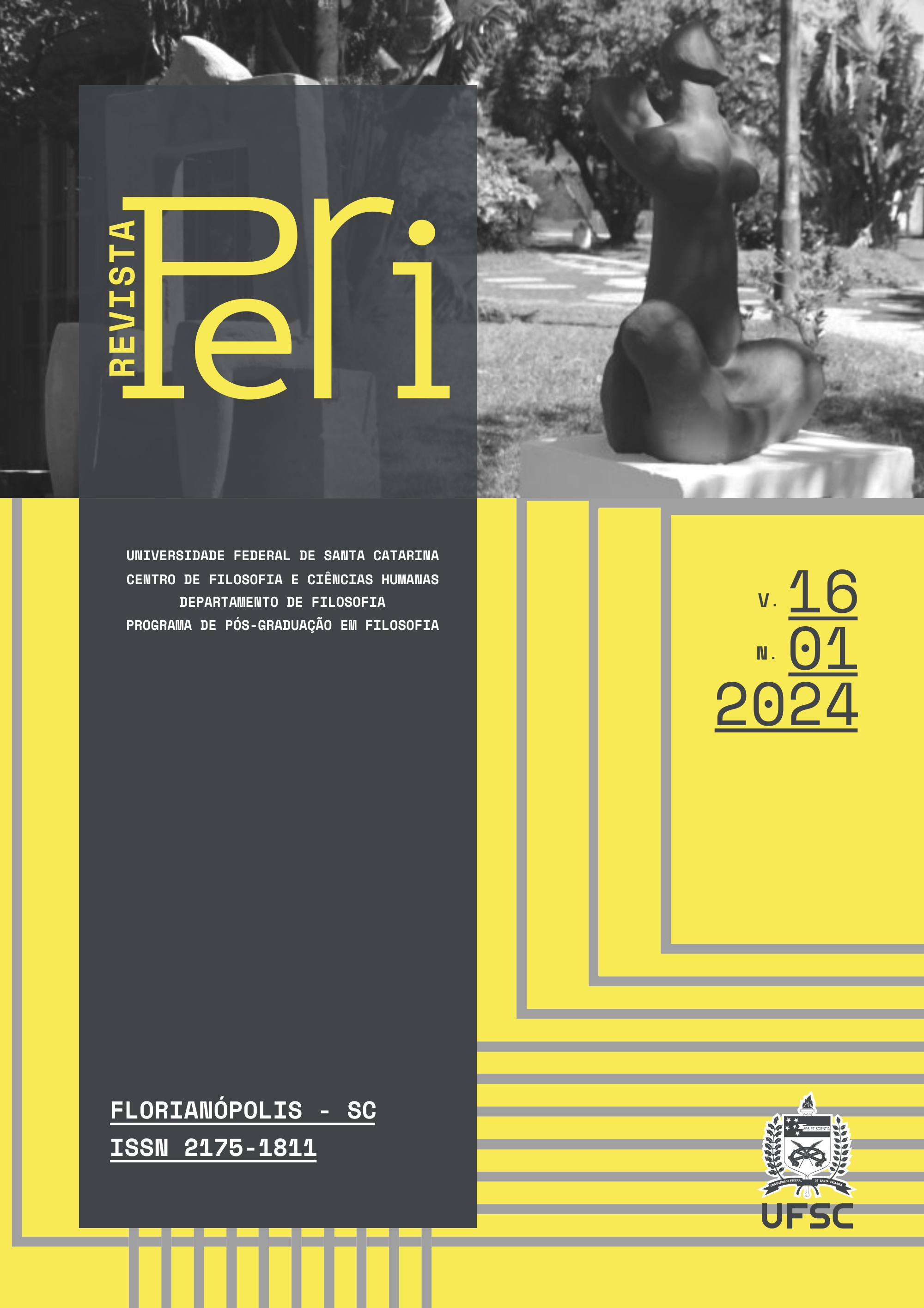Achillean Shores
parallels between the iliad and walden through Stanley Cavell
Keywords:
Walden, Iliad, Stanley Cavell, perfectionismAbstract
In this paper, parallels between Homer’s Iliad and Henry David Thoreau’s Walden are presented. It is noted that Thoreu read and incorporated mythological aspects in his writing, among them the homeric poems. This movement allows us to put forth in a comprehension of what Walden’s author understands by “heroic texts” e what is the meaning of this expression and other mythological interpretations in his writing. The present analysis culminates in showing that three aspects are important in the connection of the texts: the metaphor of planting and death, the image of dawn and the process of mourning — aspects worked through the philosophy of Stanley Cavell.
References
BECKER, Andrew Sprague. The Shield of Achilles and the Poetics of Homeric Description. The American Journal of Philology, Vol. 111, No. 2 (Summer, 1990), pp. 139-153, 1990.
BRAM, Shahar. Ekphrasis as a shield: ekphrasis and the mimetic tradition. Word & Image: A Journal of Verbal/Visual Enquiry, 22:4, pp. 372-378, 2006.
CAVELL, Stanley. The Claim of Reason: Wittgenstein, Skepticism, Morality and Tragedy. Oxford, New York, Toronto, Melbourne: Oxford University Press, 1979.
_______. Senses of Walden. Expanded Edition. Chicago, London:The University of Chicago Press, 1981.
_______. Cities of Words: Pedagogical Letters on a Register of the Moral Life. Cambridge, Massachusetts, London, England: The Belknap Press of Harvard University Press, 2004.
HEIDEN, Bruce. The Placement of ‘Book Divisions’ in the Iliad. The Journal of Hellenic Studies, Vol. 118, pp. 68-81, 1998.
HOMERO. Ilíada. Tradução de Christian Werner. São Paulo: Ubu Editora, 2018.
JAEGER, Werner Wilhelm. Paideia: a formação do homem grego. Tradução de Arthur M. Parreira. 6ª edição. São Paulo: Editora WMF Martins Fontes, 2013.
KIRK, G. S. The Iliad, a commentary. Volume V: Books 17-20. Cambridge: Cambridge University Press, 1991.
_______. The Iliad, a commentary. Volume III: Books 9-12. Cambridge: Cambridge University Press, 1993a.
_______. The Iliad, a commentary. Volume VI: Books 21-24. Cambridge: Cambridge University Press, 1993b.
MACIEL, Felipe Marques. A terminologia da “compaixão” na Ilíada, de Homero: breve contribuição à semântica de uma emoção. Revista Caminhando v. 28, pp. 1-20, jan./dez. 2023.
MURRAY, Penelope. Plato on Poetry. Cambridge, New York, São Paulo: Cambridge University Press, 1997.
NAGY, Gregory. Questões Homéricas. Tradução de Rafael Rocca dos Santos. São Paulo: Perspectiva, 2021.
OSWALD, Alice. Memorial: a version of Homer’s Illiad. First American Edition. New York, London: W. W. Norton & Company, 2012.
PALAVRO, Bruno. Pandora hesiódica. Nau Literária, vol. 16(2), pp. 22–52, 2020.
PALAVRO, Bruno. Hesiódica. Dissertação de mestrado em Letras - Instituto de Letras, Universidade Federal do Rio Grande do Sul. Porto Alegre, p. 263, 2021.
POPOVA, Maria. Figuring. New York: Pantheon Books, 2019.
SATTELMEYER, Robert. Thoreau and Emerson. Em MYERSON, Joel. The Cambridge Companion to Henry David Thoreau. Cambridge, New York: Cambridge University Press, 1995.
THOREAU, Henry David. Walden ou a vida nos bosques. Tradução de Marina Della Valle. São Paulo: Planeta, 2021.
WHITMAN, Cedric H. Homer and the Heroic Tradition. Cambridge, Massachusetts: Harvard University Press, 1958.
ZHANG, Wei. The Poet as Educator in the Works and Days. The Classical Journal, Vol. 105, No. 1 October-November, pp. 1-17, 2009.
Downloads
Published
Issue
Section
License
Copyright (c) 2024 Igor Nascimento

This work is licensed under a Creative Commons Attribution-NonCommercial-ShareAlike 4.0 International License.
1. Autores mantém os direitos autorais e concedem à revista o direito de primeira publicação, com o trabalho simultaneamente licenciado sob a Creative Commons Attribution License que permite o compartilhamento do trabalho com reconhecimento da autoria do trabalho e publicação inicial nesta revista.
2. Autores têm autorização para assumir contratos adicionais separadamente, para distribuição não-exclusiva da versão do trabalho publicada nesta revista (ex.: publicar em repositório institucional ou como capítulo de livro), com reconhecimento de autoria e publicação inicial nesta revista.
3. Autores têm permissão e são estimulados a publicar e distribuir seu trabalho online (ex.: em repositórios institucionais ou na sua página pessoal) a qualquer ponto antes ou durante o processo editorial, já que isso pode gerar alterações produtivas, bem como aumentar o impacto e a citação do trabalho publicado (Veja O Efeito do Acesso Livre).






